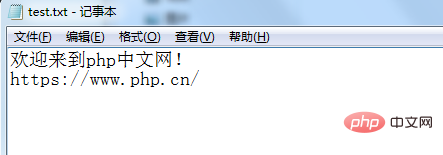PHP file operation: reading files line by line
In the previous article "php file operation - reading files character by character" we introduced a method of reading files: reading files character by character. In this article, we will show you another way to read files: read the file line by line. Let's see how to read the file content line by line and output it. Let's learn together.
There is a text file named "test.txt", the contents of which are:

How do we read the contents of the file line by line and Output? Simple, today we will introduce two methods to you.
Method 1: Using the fgets() function
Let’s take a look at the code example:
<?php
header("Content-Type: text/html;charset=utf-8"); //设置字符编码
$handle = fopen('./test.txt', 'r'); //打开文件
if (!$handle) { //判断文件是否打开成功
echo '文件打开失败!';
}
while (false !== ($char = fgets($handle,1024))) { //循环读取文件内容
echo $char."<br>";
}
fclose($handle); //关闭文件
?>Output result:

Key function analysis:
fgets() function is used to read a line of data from an open file and accepts a required parameter $file (the file being opened) and an optional parameter $length (the number of bytes to be read); if the $length parameter is omitted, the default is to read Take 1k (i.e. 1024 bytes) length.
fgets() function encounters newline character, EOF (read to the end of the file) or reaches the specified length $length-1 Stop (the maximum length of the returned string is $length-1 bytes).
If we don't know how much data is in the file, we can use the filesize() function to get it, which can return the size of the specified file (number of bytes).
So the above code example can be modified:
<?php
header("Content-Type: text/html;charset=utf-8"); //设置字符编码
$url = './test.txt';
$handle = fopen($url, 'r'); //打开文件
$size= filesize($url); //计算文件大小
if (!$handle) { //判断文件是否打开成功
echo '文件打开失败!';
}
while (false !== ($char = fgets($handle,$size))) { //循环读取文件内容
echo $char."<br>";
}
fclose($handle); //关闭文件
?>The output result is the same as above.
Method 2: Using the fgetss() function
Let’s take a look at the code example:
<?php
header("Content-Type: text/html;charset=utf-8"); //设置字符编码
$handle = fopen('./test.txt', 'r'); //打开文件
if (!$handle) { //判断文件是否打开成功
echo '文件打开失败!';
}
while (false !== ($char = fgetss($handle,1024))) { //循环读取文件内容
echo $char."<br>";
}
fclose($handle); //关闭文件
?>Output result:

Key function analysis:
The fgetss() function is similar to the fgets() function. Both can read a line of data from the open file. The difference is fgetss() The function filters out HTML and PHP tags from the data.
fgetss() function accepts one required parameter $file, two optional parameters $length and $tags. The parameters $file and $length are introduced in the fgets() function. You can learn more about them above. The parameter $tags is used to specify which tags are not to be removed. Let’s learn more about it through an example:

<?php
header("Content-Type: text/html;charset=utf-8"); //设置字符编码
$handle = fopen('./test.txt', 'r'); //打开文件
if (!$handle) { //判断文件是否打开成功
echo '文件打开失败!';
}
while (false !== ($char = fgetss($handle,1024,"<h1>,<em>"))) { //循环读取文件内容
echo $char."<br>";
}
fclose($handle); //关闭文件
?>In the above code , we set the value of parameter $tags to "<h1>,<em></em>
</h1>", that is, we do not filter <h1></h1> and <em></em> tag, so the output result is:

Note: After operating the file, remember to use the fclose() function to close the file!
Okay, that’s all. If you want to know anything else, you can click this. → →Basic operation of PHP files
## Recommended: 《PHP interview questions summary (collection)》《php video tutorial》
The above is the detailed content of PHP file operation: reading files line by line. For more information, please follow other related articles on the PHP Chinese website!

Hot AI Tools

Undresser.AI Undress
AI-powered app for creating realistic nude photos

AI Clothes Remover
Online AI tool for removing clothes from photos.

Undress AI Tool
Undress images for free

Clothoff.io
AI clothes remover

Video Face Swap
Swap faces in any video effortlessly with our completely free AI face swap tool!

Hot Article

Hot Tools

Notepad++7.3.1
Easy-to-use and free code editor

SublimeText3 Chinese version
Chinese version, very easy to use

Zend Studio 13.0.1
Powerful PHP integrated development environment

Dreamweaver CS6
Visual web development tools

SublimeText3 Mac version
God-level code editing software (SublimeText3)

Hot Topics
 1386
1386
 52
52
 PHP 8.4 Installation and Upgrade guide for Ubuntu and Debian
Dec 24, 2024 pm 04:42 PM
PHP 8.4 Installation and Upgrade guide for Ubuntu and Debian
Dec 24, 2024 pm 04:42 PM
PHP 8.4 brings several new features, security improvements, and performance improvements with healthy amounts of feature deprecations and removals. This guide explains how to install PHP 8.4 or upgrade to PHP 8.4 on Ubuntu, Debian, or their derivati
 How To Set Up Visual Studio Code (VS Code) for PHP Development
Dec 20, 2024 am 11:31 AM
How To Set Up Visual Studio Code (VS Code) for PHP Development
Dec 20, 2024 am 11:31 AM
Visual Studio Code, also known as VS Code, is a free source code editor — or integrated development environment (IDE) — available for all major operating systems. With a large collection of extensions for many programming languages, VS Code can be c
 7 PHP Functions I Regret I Didn't Know Before
Nov 13, 2024 am 09:42 AM
7 PHP Functions I Regret I Didn't Know Before
Nov 13, 2024 am 09:42 AM
If you are an experienced PHP developer, you might have the feeling that you’ve been there and done that already.You have developed a significant number of applications, debugged millions of lines of code, and tweaked a bunch of scripts to achieve op
 Explain JSON Web Tokens (JWT) and their use case in PHP APIs.
Apr 05, 2025 am 12:04 AM
Explain JSON Web Tokens (JWT) and their use case in PHP APIs.
Apr 05, 2025 am 12:04 AM
JWT is an open standard based on JSON, used to securely transmit information between parties, mainly for identity authentication and information exchange. 1. JWT consists of three parts: Header, Payload and Signature. 2. The working principle of JWT includes three steps: generating JWT, verifying JWT and parsing Payload. 3. When using JWT for authentication in PHP, JWT can be generated and verified, and user role and permission information can be included in advanced usage. 4. Common errors include signature verification failure, token expiration, and payload oversized. Debugging skills include using debugging tools and logging. 5. Performance optimization and best practices include using appropriate signature algorithms, setting validity periods reasonably,
 How do you parse and process HTML/XML in PHP?
Feb 07, 2025 am 11:57 AM
How do you parse and process HTML/XML in PHP?
Feb 07, 2025 am 11:57 AM
This tutorial demonstrates how to efficiently process XML documents using PHP. XML (eXtensible Markup Language) is a versatile text-based markup language designed for both human readability and machine parsing. It's commonly used for data storage an
 PHP Program to Count Vowels in a String
Feb 07, 2025 pm 12:12 PM
PHP Program to Count Vowels in a String
Feb 07, 2025 pm 12:12 PM
A string is a sequence of characters, including letters, numbers, and symbols. This tutorial will learn how to calculate the number of vowels in a given string in PHP using different methods. The vowels in English are a, e, i, o, u, and they can be uppercase or lowercase. What is a vowel? Vowels are alphabetic characters that represent a specific pronunciation. There are five vowels in English, including uppercase and lowercase: a, e, i, o, u Example 1 Input: String = "Tutorialspoint" Output: 6 explain The vowels in the string "Tutorialspoint" are u, o, i, a, o, i. There are 6 yuan in total
 Explain late static binding in PHP (static::).
Apr 03, 2025 am 12:04 AM
Explain late static binding in PHP (static::).
Apr 03, 2025 am 12:04 AM
Static binding (static::) implements late static binding (LSB) in PHP, allowing calling classes to be referenced in static contexts rather than defining classes. 1) The parsing process is performed at runtime, 2) Look up the call class in the inheritance relationship, 3) It may bring performance overhead.
 What are PHP magic methods (__construct, __destruct, __call, __get, __set, etc.) and provide use cases?
Apr 03, 2025 am 12:03 AM
What are PHP magic methods (__construct, __destruct, __call, __get, __set, etc.) and provide use cases?
Apr 03, 2025 am 12:03 AM
What are the magic methods of PHP? PHP's magic methods include: 1.\_\_construct, used to initialize objects; 2.\_\_destruct, used to clean up resources; 3.\_\_call, handle non-existent method calls; 4.\_\_get, implement dynamic attribute access; 5.\_\_set, implement dynamic attribute settings. These methods are automatically called in certain situations, improving code flexibility and efficiency.




